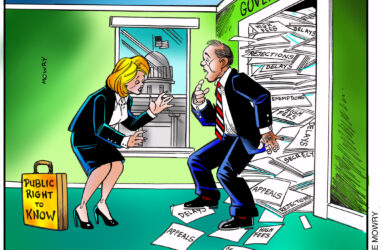As last resort, Chronicle files complaint with Ethics Commission
On March 14, now a full month ago, The Chronicle was unlawfully booted from the Creswell School Board executive session — a blatant violation of Public Meetings Law. The Chronicle raised the red flag on government transparency as a result of actions taken by the school board that evening.
We would love to report that this matter with the school board has since been remedied, that the District has complied and met all our requests to hand over those materials, that this was just a big misunderstanding with an easy fix.
But since then, that red flag has been pulled further and further up the flagpole, as the District repeatedly failed to comply with our simple request: show us the proper materials from that executive session, and this issue will be resolved.
In good conscience, The Chronicle cannot report this matter is resolved. We cannot do so because all our attempts to recover executive session materials have been repeatedly met with a reiteration of the statutes.
The Chronicle firmly believes there have now been two law violations racked up by the District — unrightfully barring media from an executive session and an apparent failure to take proper meeting minutes in any from during that session.
With all other options exhausted, The Chronicle filed a complaint with the Oregon Government Ethics Commission on Monday, April 9.
We’ve related in two editorials since that it is The Chronicle’s responsibility to hold the District accountable for their actions, to keep pressing for those executive session materials, to find a resolution to this issue and to keep the public informed. After a month’s worth of attempts, we feel as though we’ve done all we could do to try to work out this issue directly with the District.
We gave the District a month to explain their reasoning, to correct their errors, to make their voices known in these editorials, or in another platform in our newspaper. But it’s been crickets in terms of defense, and it’s been nothing but insufficient document shells handed over to The Chronicle time and time again.
It is now in the hands of the Oregon Government Ethics Commission to investigate The Chronicle’s findings, and to hold the District accountable.
Since the incident began, The Chronicle has had ongoing communication with Superintendent Todd Hamilton, filing requests to release those materials to the media. Having access to those materials is a fundamental right backed by the Public Records and Meetings Law, a set of rules governing bodies are required to follow.
On March 21, a full week after I was kicked out of the meeting, Hamilton and Board Chair Mike Anderson agreed to meet with us. At that meeting, they showed us materials from that meeting, which was a packet of emails. In those emails, I found no evidence to suggest there was any inclusion of a student’s medical records, or anything else that would warrant the exclusion of media from that meeting.
As previously mentioned, the terms under which the school board met in executive session, as listed on their agenda, do not constitute acceptable disallowance of media attendance.
The Chronicle was not given any supporting documents to confirm that the email materials presented were in fact the topic of discussion at that executive session meeting. It also does not confirm whether or not the board met properly in that meeting.
On March 23, still unsatisfied with the materials recovered, we reached out again to Hamilton and requested that meeting minutes be made available.
The Attorney General’s Public Records and Meetings Manual explicitly requires that the governing body of a public body provide sound, video or digital recording, or written minutes of its meetings. The record of a meeting, whether preserved in written minutes or a sound, video or digital recording, shall include at least the following information:
▲ members present;
▲ motions, proposals, resolutions, orders, ordinances and measures proposed and their disposition;
▲ results of all votes, and the vote of each member by name;
▲ the substance of any discussion matter;
▲ and a reference to any document discussed at the meeting.
Hamilton responded that day with a memo he called the minutes, which listed a regurgitation of the statutes, and offered no information other than what was already presented on the original agenda.
The Meetings Manual states that “any completed minutes or sound, video or digital recordings are public records subject to disclosure under the Public Records Law.”
On March 27, still dissatisfied, The Chronicle requested that the written or typed meeting notes that were supposed to be taken by Secretary Marilyn Cruzan be made available to us.
On April 3, that request was answered by Hamilton. But once again, The Chronicle was sent the same reiteration of the statutes, just handwritten in pencil by Cruzan.
The Attorney General’s Public Records and Meetings Manual explicitly states that “whatever means of recording used must give a ‘a true reflection of the matters discussed at the meeting and the views of the participants.’”
The minutes twice given to The Chronicle do not show any reflection of what happened at that meeting and are most certainly not a reflection of discussion held or the views of the participants. The Chronicle cannot confirm that the email materials that were presented constitute the topic of discussion, based on the minutes provided.
Given what The Chronicle was continuously presented with, the District does not appear to have a proper record of that meeting, even for their own use. At this point, this issue expands beyond disclosure.
How would a simple reiteration of the statutes, in lieu of properly recorded minutes, serve the District in the future if they needed to go back and reference what was discussed in that executive session?
This is not a “Mother, may I?” situation with the superintendent; this is a matter of the District doing what they are required to do by law.
One would think that if this was a simple misunderstanding, if there were no intentions to violate Oregon Public Meetings Law, that after a month’s worth of attempts to recover that executive session material from the District, it would have been provided. Instead, this process has only raised questions, and has not answered any.
Media access denied. No record is kept. What is going on with District administration?






